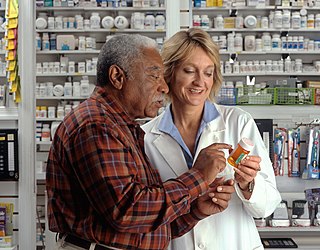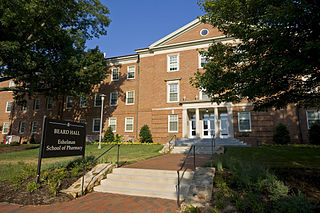Related Research Articles

A pharmacist, also known as a chemist or a druggist, is a health professional who specializes in the preparation, properties, effects, interactions and use of medicines. The pharmacist provides pharmaceutical care to patients, as well as basic primary health care services. Using knowledge of the mechanism of action of drugs, the pharmacist understands how they should be used to achieve maximum benefit, minimal side effects and to avoid drug interactions. Pharmacists undergo university or graduate-level education to understand the biochemical mechanisms and actions of drugs, drug uses, therapeutic roles, side effects, potential drug interactions, and monitoring parameters. This is mated to anatomy, physiology, and pathophysiology. Pharmacists interpret and communicate this specialized knowledge to patients, physicians, and other health care providers.

Pharmacy is the clinical health science that links medical science with chemistry and it is charged with the discovery, production, disposal, safe and effective use, and control of medications and drugs. The practice of pharmacy requires excellent knowledge of drugs, their mechanism of action, side effects, interactions, mobility and toxicity. At the same time, it requires knowledge of treatment and understanding of the pathological process. Some specialties of pharmacists, such as that of clinical pharmacists, require other skills, e.g. knowledge about the acquisition and evaluation of physical and laboratory data.
A Doctor of Pharmacy is a professional doctorate in pharmacy. In some countries, it is a first professional degree and a prerequisite for licensing to practice the profession of pharmacy or to become a clinical pharmacist. In many countries they are allowed to practice independently and can prescribe drugs directly to patients. A PharmD program has significant experiential or clinical education components in introductory and advanced levels for the safe and effective use of drugs. Experiential education prepares graduates to be practice-ready, as they already have spent a significant amount of time training in areas of direct patient care and research.
The Master of Sciences of Pharmacy (MPharm) is the standard master's degree program in Pharmacy. It is the oldest honorable Diploma (Degree) authorized from the European Faculties of Pharmacy as it takes five years to complete. It is based on a credit system higher than the normal Bachelor of Pharmacy degree. It is different from the American Pharmaceutical Diploma, Doctor of Pharmacy,(PharmD), that takes 4 years to complete. The Faculty is a member of the Association of European Faculties of Pharmacy and its graduates meet all the requirements for the profession as defined by the European Union. In the initial three years students revise and broaden their knowledge of elementary natural and medical subjects to the level required for understanding specific subjects from the field of Pharmacy. Students attend lectures and seminars and take part in practical pharmacy placements. During the last year of study they work on their thesis. The program is concluded by defending the thesis and taking the final state examination. Then the students are awarded the master's degree. The study program is compliant with EU directive 2005/36/EC. Graduates awarded the master's degree can later sit for a thorough state exam including an advanced thesis defense. After passing they are awarded the "Testing Board" degree. Graduates can apply for postgraduate after studying several branches of Pharmacy in the five accredited years. After defending their dissertation, submit their researches in their selected branches of Pharmacy and passing the final state examination they are awarded the degree. The master's program is offered in different specialized areas, one major being Clinical Pharmacy. Clinical pharmacy specialization enables pharmacists to deliver higher levels of clinical services. In some countries these specializations are happening with residency programs.
The basic requirement for pharmacists to be considered for registration is an undergraduate or postgraduate pharmacy degree from a recognized university. In many countries, this involves a four- or five-year course to attain a master of pharmacy degree (MPharm). In the United States of America, students graduating after January 1, 2003, must complete a doctor of pharmacy degree to become a licensed pharmacist. This same requirement has been coming into place in other countries such as Canada and France.

The University of Florida College of Pharmacy is the pharmacy school of the University of Florida. The College of Pharmacy was founded in 1923 and is located on the university's Gainesville, Florida main campus. The college offers the entry-level Doctor of Pharmacy (Pharm.D.) degree as the first professional degree for students entering the profession. The college offered a Working Professional Pharm.D. (WPPD) program for bachelor's-trained pharmacists already in practice with its last cohort of students enrolled in 2016. Additionally, various graduate degrees are offered. The professional program is fully accredited by the American Council on Pharmaceutical Education. Since 2011 the college has been offering online degree programs at the graduate level, such as the Forensic Science Program, Pharmaceutical Chemistry Program and Clinical Toxicology Program. In total the College of Pharmacy received over $28.3 Million in total Research Revenues in 2019.
Joseph T. DiPiro is professor and Archie O. McCalley Dean of the Virginia Commonwealth University School of Pharmacy.

The UNC Eshelman School of Pharmacy is located at the University of North Carolina at Chapel Hill with a satellite campus at UNC Asheville; the satellite opened in 2011 and graduated its first class in 2015.

The UNC Lineberger Comprehensive Cancer Center is a cancer research and treatment center at the University of North Carolina at Chapel Hill. One of 52 National Cancer Institute-designated comprehensive cancer centers in the United States, its clinical base is the N.C. Cancer Hospital, part of the UNC Health Care system. UNC Lineberger is the only public NCI-designated comprehensive cancer center in the state of North Carolina. The current director is H. Shelton Earp III who succeeded current NCI director Norman Sharpless.

Chinedum Peace BabalolaFAS, FAAS is a Nigerian Professor of Pharmaceutical chemistry and Pharmacokinetics. She is the first female Professor of Pharmacy in the University of Ibadan, FAS and FAAS and the second female Nigerian FAAS. She is the incumbent Vice Chancellor of Chrisland University, Nigeria.

The USC School of Pharmacy is the pharmacy school of the University of Southern California, originally established in 1905 as USC College of Pharmacy. In 1918, it created the four-year Bachelor of Science in pharmacy degree program. In 1950, it established the nation's first Doctor of Pharmacy (PharmD) program. The School offers numerous dual- and joint-degree programs in such fields as law, business, public health, regulatory science, healthcare decision analysis, and gerontology. The School launched the nation's first PharmD/MBA dual degree in 1990, the first PhD in pharmaceutical economics and policy in 1994, the first professional doctorate in regulatory science in 2008, and a translational science graduate program that merges science with clinical expertise. The School is led by Dean Vassilios Papadopoulos.
Mark H. Schoenfisch is an American analytical chemist. He is the Peter A. Ornstein Distinguished Professor of Chemistry at the University of North Carolina at Chapel Hill and is jointly appointed with the institution's Schools of Medicine and Pharmacy. His research interests include analytical sensors, biomaterials, and the development of macromolecular nitric oxide release scaffolds as novel therapeutics. Intellectual property originating from his research group is the basis of technology being commercialized by Novan, Diabetic Health, and Vast Therapeutics located in the Research Triangle Park.

Robert Mark Wightman is an electrochemist and professor of chemistry at the University of North Carolina at Chapel Hill. He is best known for his work in the areas of ultramicroelectrodes, electrochemistry, and neurochemistry. One of Wightman's most notable achievements is the development of the ultramicroelectrode and microelectrode voltammetry. At the same time as Wightman's innovations, the microelectrode was developed independently by Martin Fleischmann at the University of Southampton. In 2011, Wightman had the 192nd highest h-index, 74, of any living chemist. As of 2018, Wightman was an author of over 390 papers and had an h-index of 103.
Namandjé N. Bumpus is an American pharmacologist. She is director of the department of pharmacology and molecular sciences at Johns Hopkins University School of Medicine, where she holds the E.K. Marshall and Thomas H. Maren professorship in pharmacology. Bumpus is known for her research on the metabolism of antiviral drugs used to treat HIV-1 and how genetic variations in drug-processing enzymes may impact these drugs' efficacy. Bumpus received a Presidential Early Career Award for Scientists and Engineers in 2016.

Julie Ann Johnson is an American clinical pharmacist and translational scientist. She is the Dean and Distinguished Professor in the University of Florida College of Pharmacy and a Member of the National Academy of Medicine. For four consecutive years, she was a Clarivate Analytics Highly Cited Researcher in Pharmacology and Toxicology, indicating she was one of the "world's leading scholars in the sciences and social sciences in the preceding decade."

Mary Violet Relling is an American pharmacogeneticist. Relling's research focuses on pharmacokinetics and pharmacodynamics in children and how genome variability influences a child's response to cancer chemotherapy.

Charles Williams Flexner is an American physician, clinical pharmaceutical scientist, academic, author and researcher. He is a Professor of Medicine at the Johns Hopkins University School of Medicine.
Howard E. Gendelman is an American physician-scientist whose research intersects the disciplines of neuroimmunology, pharmacology, and infectious diseases. Gendelman was born in Philadelphia, Pennsylvania. He is renowned for his research in harnessing immune responses for therapeutic gain in HIV/AIDS and Neurodegenerative disease. He is an author, editor, educator, and mentor.
Lee Limbird is a pharmacologist, Dean of the School of Natural Science, Mathematics and Business & Professor in the Department of Life and Physical Sciences at Fisk University, Nashville, Tennessee.
References
- ↑ "University of North Carolina at Chapel Hill Pharmacotherapy and Experimental Therapeutics". PharmGrad. Retrieved 6 August 2018.
- 1 2 3 "ANGELA KASHUBA, PHARMD". Virology Education. Retrieved 6 August 2018.
- ↑ "CLINICAL PHARMACOLOGY AND ANALYTICAL CHEMISTRY CORE". UNC CFAR. Retrieved 6 August 2018.
- 1 2 3 "Angela D.M. Kashuba, BScPhm, PharmD, DABCP". antimicrobe.org. Retrieved 6 August 2018.
- 1 2 Laura, Hoopes. "Angela Kashuba featured in NIH Women in Science Update". Nature.com. Retrieved 6 August 2018.
- ↑ Pope, R Jr; Kashuba, A (December 2017). "Darunavir for use in pregnant women with HIV". Expert Rev Clin Pharmacol. 10 (12): 1317–1327. doi:10.1080/17512433.2017.1390428. PMID 28988509. S2CID 31650716.
- ↑ Cottrell, ML; Srinivas, N; Kashuba, A (June 2015). "Pharmacokinetics of antiretrovirals in mucosal tissue". Expert Opin Drug Metab Toxicol. 11 (6): 893–905. doi:10.1517/17425255.2015.1027682. PMC 4498566 . PMID 25797064.